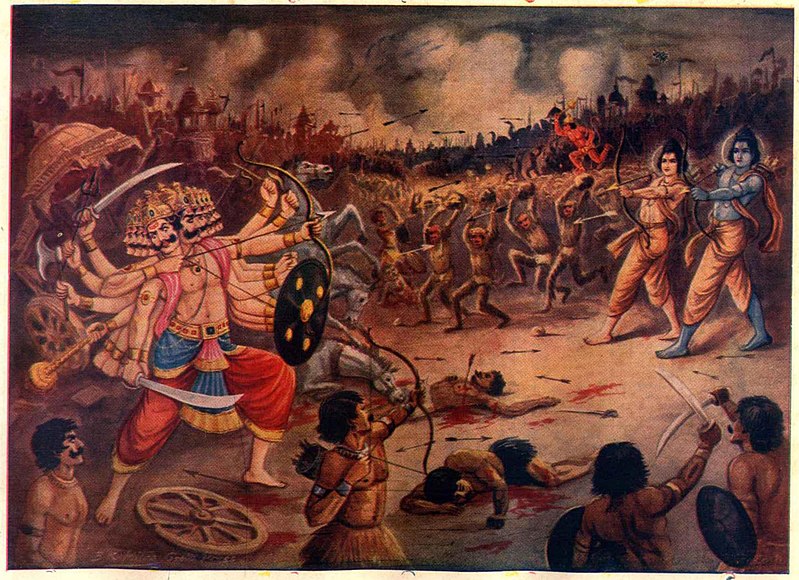 |
| 10 Names of Ravana |
In the rich tapestry of Indian mythology, Ravana stands as a complex figure—one who was not only a formidable adversary but also a learned scholar, a devoted son, and a passionate king.
According to a popular Hindu legend, Ravana once attempted to lift Mount Kailash, where Lord Shiva resides. When Shiva realized Ravana's audacity, he simply pressed his toe down on the mountain, pinning Ravana's hands beneath it. In unbearable pain, Ravana let out an earth-shattering cry that caused the ground to tremble. It is believed that this cry gave him the name Ravana, meaning "one who can shake the earth with his scream." The legend also highlights Ravana’s deep devotion to Shiva, as it was only after singing the Ravana Shiva Stotram that he was released from the mountain.
Throughout the Ramayana and its regional adaptations, Ravana has been referred to by various names, each reflecting a different facet of his character.
This post delves into some of the lesser-known epithets of Ravana, revealing the depth and breadth of his mythological presence.
Dasagriva
One of the earliest titles bestowed upon Ravana is Dasagriva, found in the Valmiki Ramayana. This name is derived from two Sanskrit words—dasa, meaning "ten," and griva, meaning "neck" or "beautiful singing voice." Dasagriva thus translates to "one with ten beautiful singing voices" or "one who can sing in ten different voices." This reflects Ravana’s mastery in music and the arts, an often overlooked aspect of his personality.
Dashakantha
Similar to Dasagriva, Dashakantha is another name that emphasizes Ravana's unique physical attribute. It comes from dasha (ten) and kantha (voice box or throat), thus meaning "one with ten voices." This title reinforces Ravana's association with extraordinary knowledge and the power of communication, a gift that he wielded both in diplomacy and war.
Iraavanan
In Tamil literature, Ravana is referred to as Iraavanan. This name is composed of two Tamil words—Ira, meaning "boy," and Avanan, translating to "a man of strong principles" or "one of incomparable beauty." The title reflects Ravana’s revered position in certain Tamil traditions, where his virtues as a ruler are highlighted, particularly his unwavering dedication to his people and his kingdom.
Iravaan
A Sanskritized version of the Dravidian name Iraivan, Iravaan in Tamil or Dravidian languages means "the king" or "lord." This name underscores Ravana’s sovereignty and power over Lanka, his magnificent kingdom. It emphasizes his role not just as a demon king but as a monarch who ruled with might and wisdom, a fact acknowledged even by his adversaries.
Ravana
According to Lankan folklore, the name Ravana is said to originate from the Sanskrit words Rakshak (protector) and Vana (forest), giving a unique meaning to his name—"one who looks after the jungle." This interpretation presents Ravana as a guardian of nature and the land he ruled, painting him as a far more complex figure than the villain he is often portrayed to be.
Dashamukha
Another popular name for Ravana is Dashamukha, derived from the Sanskrit words dasha (ten) and mukha (face). This title, meaning "one with ten faces," highlights Ravana's immense intellect and his ability to view the world from multiple perspectives. It is said that these ten faces represented his vast knowledge of the four Vedas and six Shastras, making him one of the most learned beings of his time.
Dashaanan
Similar to Dashamukha, Dashaanan means "one with ten faces or heads." This name again reflects Ravana’s immense intelligence and his mastery over numerous disciplines, but also symbolizes his insatiable desires and ego, which ultimately led to his downfall.
Dashakandhara
Like Dashamukha and Dashagriva, Dashakandhara comes from the words dasha (ten) and kandhara (neck), meaning "one with ten necks." This name further reinforces Ravana's association with ten heads and symbolizes his strength and power in both physical and intellectual realms.
Eka-Virya
Another name associated with Ravana is Eka-Virya, which means "the one with single-handed courage." This name emphasizes Ravana’s unmatched bravery in battle. Known for his fierce combat skills, Eka-Virya reflects Ravana’s belief in his own strength, as he rarely needed anyone’s help to confront his enemies. It symbolizes his confidence and fearlessness, qualities that made him both admired and feared.
Lankapati/Lankesh/Lankeshwara
A straightforward title, Lankapati means "Lord of Lanka." It emphasizes Ravana’s sovereignty over his golden kingdom, Lanka, which was renowned for its wealth, beauty, and architectural marvels. Lankesh and Lankeshwara also means the same.
Dasis
Dasis is a corrupted form of the Sanskrit name Dashashis, which translates to "one with ten heads." Like his other names that emphasize his ten heads, this one also reflects Ravana’s complex nature and his vast capacity for knowledge and power.
Other Names of Ravana
In various adaptations of the Ramayana across cultures, Ravana is referred to by several other names, including:
- Dashamesha
- Thotsakan (in Thai Ramakien)
- Lawana (in Maranao tradition in the Philippines)
Note: This is the second post in the Dashamukha Series. If you missed the last post, you can catch up with Dussehra: Something More Than Rama and Ravana. Stay tuned for more insights into the rich, multifaceted character of Ravana by subscribing to our RSS feeds or Facebook page.

This article is old but yet this information was really helpful. Thank you Hemendra
ReplyDeleteNice
ReplyDelete